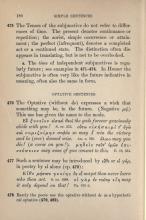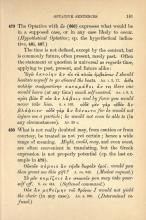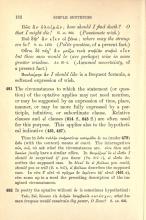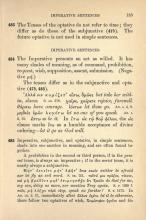476. The Optative (without ἄν) expresses a wish that something may be, in the future. (Negative μή.) This use has given the name to the mode.
Εὖ ξυνεῖεν εἰσαεὶ θεοί.
The gods forever graciously abide with you!
Soph. Oedipus the King 275
οὕτω νικήσαιμί τʼ ἐγὼ καὶ νομιζοίμην σοφός.
So may I win the victory and be (ever) deemed wise.
Aristoph. Clouds 520
ὄλοιο.
May you die! (A curse on you!).
μηδεὶς ταῦτʼ ῡ̔μῶν ἐπινεύσειεν.
May none of you consent to this.
Demosthenes 18.324
477. Such a sentence may be introduced by εἴθε or εἰ γάρ, in poetry by εἰ alone (cp. § 470).
Εἴθε μήποτε γνοίης ὃς εἶ.
Mayst thou never learn who thou art.
Soph. Oedipus the King 1068
εἰ γὰρ ἐν τούτῳ εἴη.
May it only depend on that!
Plato Protagoras 310d–e
478. Rarely the poets use the optative without ἄν as a hypothetical optative (§§ 479 and 482, below).
479. The Optative with ἄν (§ 666) expresses what would be in a supposed case, or in any case likely to occur. (Hypothtical Optative; cp. the hypothetical indicative, §§ 461, 467.)
The time is not defined, except by the context, but is commonly future, often present, rarely past. Often the statement or question is universal as regards time, applying to past, present, and future alike.
Ἐγὼ ὀκνοίην ἂν εἰς τὰ πλοῖα ἐμβαίνειν.
I should hesitate myself to go aboard the boats.
Xen. Anabasis 1.3.17
ἔνθα πολλὴν σωφροσύνην καταμάθοι ἄν τις.
There one would learn (at any time) much self-control.
Xen. Anabasis 1.9.3
πρὸς βίᾱν δʼ οὐκ ἂν λάβοις.
And by force you would never take him.
Soph. Philoctetes 103
ἐμὲ μὲν γὰρ οὐδὲν ἂν βλάψειεν· οὐδὲ γὰρ ἂν δύναιτο.
For he would not injure me a particle; he would not even be able to (in any circumstances).
Plato Apology 30c
480. What is not really doubted may, from caution or from courtesy, be treated as not yet certain; hence a wide range of meaning. Might, could, may, and even must, are often convenient in translating, but the Greek expression is not properly potential (cp. the last example in § 479, above).
Οὐκοῦν πόροις ἂν τήνδε δωρεᾱ̀ν ἐμοί;
Would you then grant me this gift? (Modest request)
Aesch. Prometheus Bound 616
Σὺ μὲν κομίζοις ἂν σεαυτόν.
You may take yourself off. (Softened command)
Soph. Antigone 444
Οὐκ ἂν μεθείμην τοῦ θρόνου.
I would not yield the chair (in any case). (Determined refusal)
Aristoph. Frogs 830
Πῶς ἂν ὀλοίμᾱν;
How should I find death? O that I might die! (Passionate wish.)
Eur. Alcestis. 864
Ποῦ δῆτʼ ἂν εἶεν οἱ ξένοι;
Where may the strangers be? (Polite question, of a present fact)
Soph. Electra 1450
Οὗτοι δὲ τάχʼ ἂν μείζω τινὰ σοφίᾱν σοφοὶ εἶεν.
But these men would be (are perhaps) wise in some greater wisdom.
Plato Apology 20d–e
Βουλοίμην ἂν (I should like) is a frequent formula, a softened expression of wish.
481. The circumstances to which the statement (or question) of the optative applies may not need mention, or may be suggested by an expression of time, place, manner, or may be more fully expressed by a participle, infinitive, or subordinate clause. Relative clauses and εἰ clauses (§§ 614 ff., 615 ff.) are often used for this purpose. This applies also to the hypothetical indicative (§§ 461, 467).
Thus in ἔνθα πολλὴν σωφροσύνην καταμάθοι ἄν τις (under § 479, above) ἔνθα (with the context) means at court. The interrogatives πῶς, ποῦ, and τίς ask what the circumstances are. τότε (then) and δικαίως (justly) have a similar office.
In θαυμάζοιμʼ ἂν εἰ οἶσθα I should be surprised if you know (Plato Protagoras 312c), εἰ οἶσθα describes the supposed case.
In δύναιʼ ἂν εἰ βούλοιο you could, should you so will (Eur. Bacchae 947), εἰ βούλοιο describes the supposed case.
In τότε δʼ αὐτὸ τὸ πρᾶγμα ἂν ἐκρῑ́νετο ἐφʼ αὑτοῦ (§ 461.c), τότε sums up in a word the preceding description of the imagined circumstances.
482. In poetry the optative without ἄν is sometimes hypothetical.
Τεᾱ́ν, Zεῦ, δύνασιν τίς ἀνδρῶν ὑπερβασίᾱ κατάσχοι;
What human trespass would constrain thy power, O Zeus?
Soph. Antigone 605
483. The tenses of the optative do not refer to time; they differ as do those of the subjunctive (§ 475). The future optative is not used in simple sentences.




